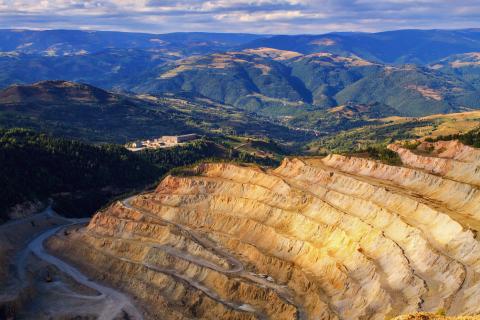
Mission critical: Without responsible mining, there is no energy transition
A new report details key governance risks for energy transition minerals, and how stakeholders can strengthen oversight of mineral value chains.
If governed well, the mining sector can help countries meet climate and energy security priorities. A new report examines the risks at play, and proposes how diverse stakeholders can strengthen oversight of mineral value chains for the energy transition.
The energy crisis is topping policy agendas in many countries. The geopolitical fallout from the war in Ukraine has sent energy prices skyrocketing. Enduring energy poverty and poor infrastructure have been compounded by supply disruptions.
Many governments are doubling down on fossil fuels; Germany is reopening coal plants while the UK is expected to issue dozens of new oil and gas licenses in the North Sea. Coal mining had a comeback this year in places like Colombia, Indonesia and Australia, and the Democratic Republic of the Congo, Ghana and Senegal auctioned off their gas reserves.
The Czech Presidency of the Council of the European Union has maintained that energy security issues are currently more pressing than the energy transition. If this is the dire situation in Europe, where does it leave the urgent energy needs of other regions?
Such trends could derail momentum behind global climate action, casting doubt on the prospects for achieving the goals of the Paris Agreement. But the energy crisis could also be an opportunity. If energy security is to be a priority in the long term, countries will have to reduce reliance on fossil fuels and scale up renewable energy supplies.
The mining sector is critical to making a low-carbon future a reality. Deploying technologies at the pace and scale needed to meet energy needs and tackle climate change requires reliable supplies of minerals. Lithium, cobalt, graphite and rare earth elements are needed mainly for battery storage and electric vehicles (EVs). Aluminium, copper, nickel, manganese, tin, titanium, zinc and other metals are needed for EVs, solar panels, wind turbines and electricity networks.
Demand for energy transition minerals is expected to rise significantly, but not uniformly or predictably for specific commodities. Minerals used across a wide range of technologies may increase steadily. Minerals with narrow applications may be substituted as technology changes. Those found in only a few places are more at risk of supply disruptions than those occurring commonly.
Rising and unpredictable demand for transition minerals puts pressure on governance at all levels. Mismanagement and corruption could slow down the global transition to net zero and curtail economic growth. Consideration of governance and corruption risks were virtually absent at last year’s COP26 climate conference. As world leaders gather in Egypt this month, they should consider the role that mining governance plays in keeping the energy transition on track.
Governance weaknesses could disrupt the transition to net zero
A new report, commissioned by the EITI and produced by the University of Queensland’s Sustainable Minerals Institute, argues that the energy transition’s escalating demand for minerals heightens risks for communities and eco-systems close to extractive industries. If not well governed, mining impacts could hinder the sector’s contribution to sustainable development and inhibit the fight against climate change. Spanning across global, transnational, national and subnational levels of mineral governance, other risks are manifold, ranging from regulatory shortcuts and corrupt deals, to price shocks and lost revenues.
For policymakers, the message is clear: governance weaknesses could disrupt the supply of minerals needed for low-carbon energy technologies. This could slow the pace of decarbonisation and make it more difficult for countries to wean themselves off fossil fuels.
Beyond the importance of strengthening energy security, we need to confront the question of who benefits from the deployment of low-carbon energy and who bears the burden of supplying minerals. Ignoring governance challenges could mean that the energy transition compromises human rights and biodiversity, and could be at odds with growing expectations around responsible sourcing and sustainable business conduct. The means of minerals production and trade need to be consistent with the ends to which they are used: they must benefit all people and the planet, leaving no one behind.
Mining governance needs to be on the COP27 agenda
The COP27 deliberations in Egypt are taking place in a strained geopolitical context. As world leaders consider how to maintain momentum in the fight against climate change, the importance of strengthening mining sector governance must be on the agenda.
Bolstering transparency and multi-stakeholder dialogue in the mining sector is critical. The EITI has provided the benchmark for this for the last 20 years. Currently, nearly 60 countries around the world implement the EITI Standard, through which they disclose revenue flows, contracts, company ownership structures and other information that underpins good governance.
The mining sector can support the energy transition and energy security, while helping achieve sustainable development outcomes in minerals-producing countries – but only with good governance.
Mission critical: Strengthening governance of mineral value chains for the energy transition
This report provides an overview of global value chains of transition minerals, as well as governance risks and opportunities.
Related content





